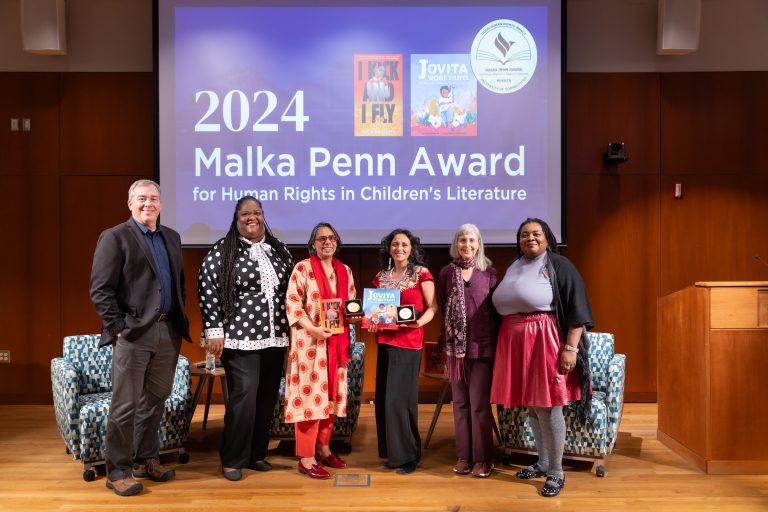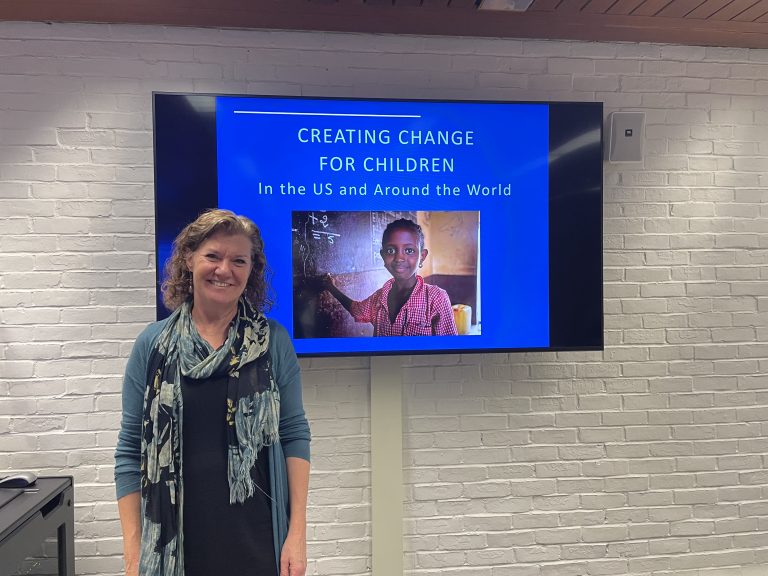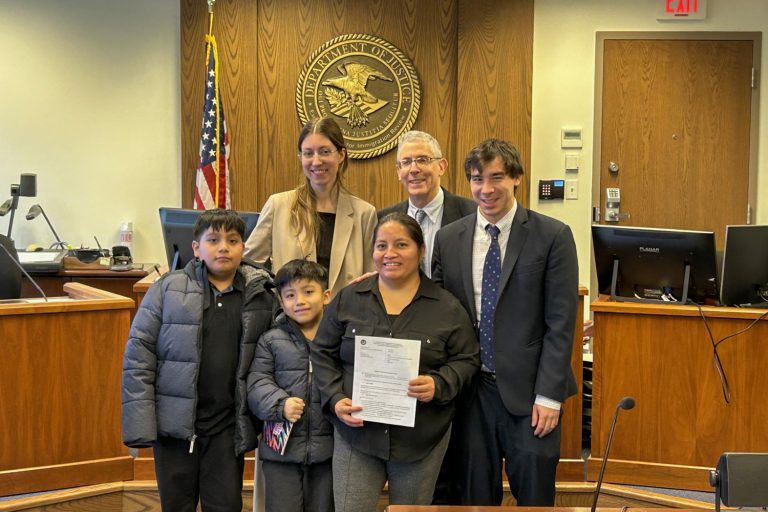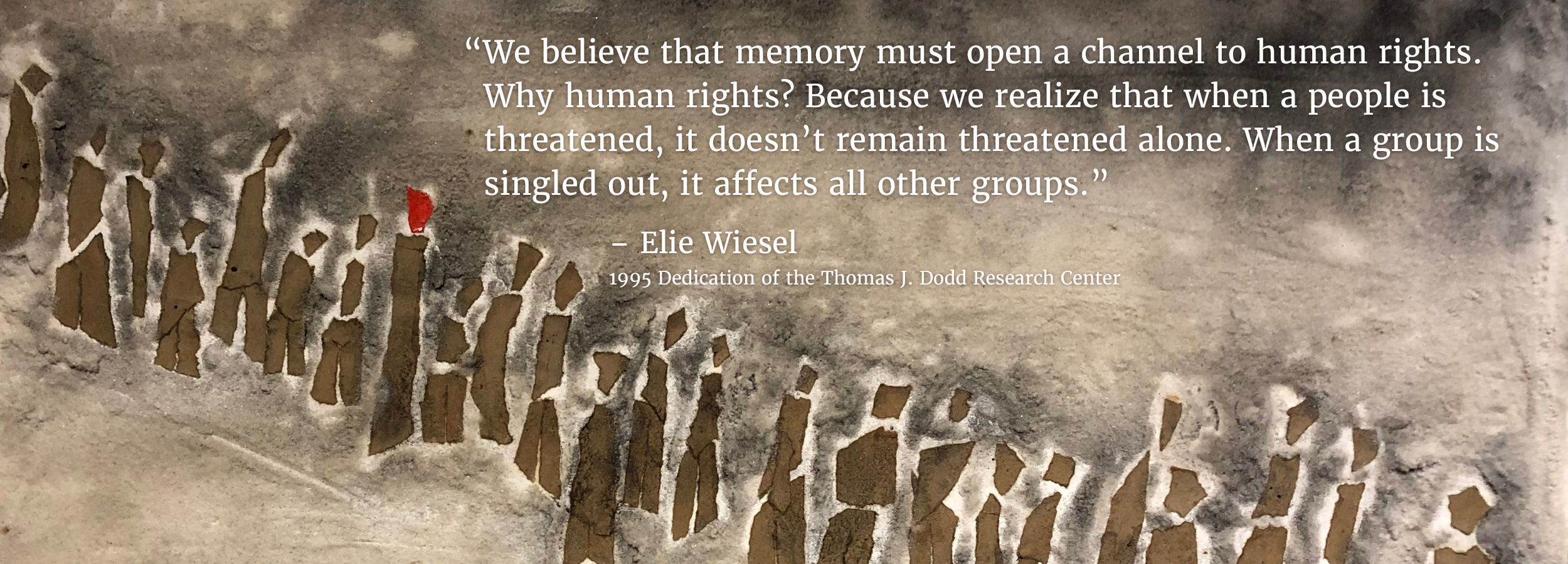
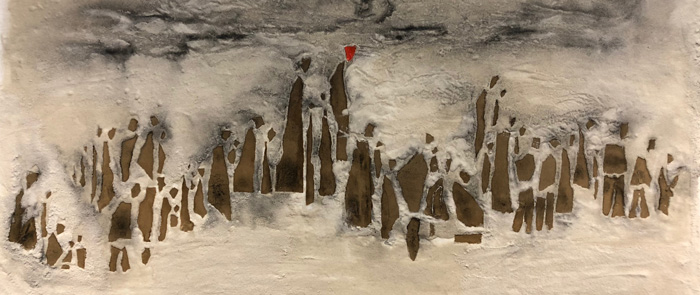
HUMAN RIGHTS AT UCONN
Examining the most pressing human rights questions and preparing the next generation of human rights leaders.

Human Rights for the Next Generation
On October 1, 1946, the International Military Tribunal at Nuremberg delivered its verdict, convicting 19 Nazi leaders of conspiracy, crimes against peace, war crimes, and crimes against humanity.
Seventy-five years later, as the world faces new challenges to democracy and rule of law, we dedicate The Dodd Center for Human Rights, extending the legacy of Nuremberg for the next generation.
Learn more about the event we hosted on October 15, 2021 featuring Senator Chris Dodd and President Joe Biden.

Evolving Landscapes of Human Rights
Celebrating 20 Years of Interdisciplinarity & Innovation
March 29-31, 2023 • Storrs, CT
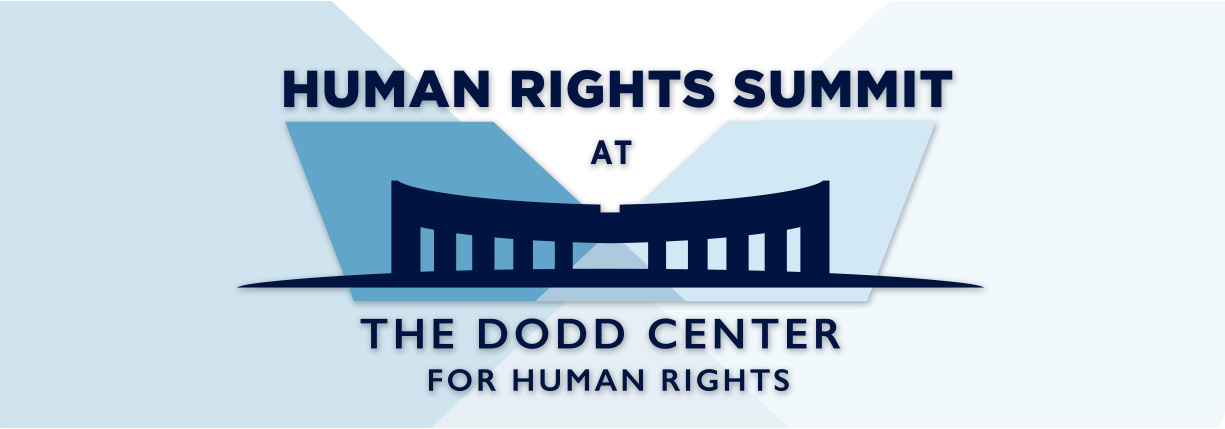
Human Rights and the Global Assault on Democracy
October 25-27, 2023
The Human Rights Summit at The Dodd Center for Human Rights brings together scholars, activists, policymakers, artists, and business leaders from across the world to examine the key human rights challenges of our time and generate new ideas to promote global justice and human dignity.
Through a mix of high-profile lectures, practical workshops, and roundtable discussions, the Human Rights Summit will serve as a critical venue for sharing insights, building relationships, and inspiring action.
In the News
AI Odyssey at Hartford Public Library’s Albany Library
A partnership between the Hartford Public Library, University of Connecticut, and the Connecticut/Baden-Württemberg Human Rights Research Consortium culminated in a two-day event, AI Odyssey, aiming to bridge the digital divide in AI and support teens learning to harness innovative technologies.
[Read More]A New Human Rights Education Program to Promote Civic Engagement: Human Rights Close to Home
Human rights education and rights-based approaches to learning can help cultivate transformative agency for both teachers and students and contribute to securing human rights for all.
[Read More]Checking In With The U.S. Treasurer
Human Rights graduate student Sage Phillips ’22 (CLAS), ’24 MA, speaks with U.S. Treasurer Lynn Malerba ’08 MPA, Chief of the Mohegan Tribe, on the significance of her role as both a tribal leader and senior U.S. official, as well as the values of representation and inspiration.
[Read More]Upcoming Events
-
 UConn Dialogic Classroom 8:30am
1/15
UConn Dialogic Classroom 8:30am
1/15
UConn Dialogic Classroom
Wednesday, January 15th, 2025
08:30 AM - 04:00 PM
IPB

DIALOGUE IN THE CLASSROOM
This two-day training is designed to support faculty and instructors in fostering a more open, connected, and conversational classroom culture. With the launch of the new dialogue competency in general education coming soon, this workshop will help prepare participants to integrate dialogue into their teaching and help shape how UConn prepares students to be competent in dialogue. This workshop is suitable for all levels of experience with dialogue and for all disciplinary approaches. Participants will leave with practical dialogue tools to use in the classroom, including designing a Reflective Structured Dialogue for the participants’ campus contexts.
ABOUT THIS WORKSHOP
The workshop will be run by Essential Partners in cooperation with the Common Curriculum Committee (CCC+), Democracy & Dialogues Initiative (Dodd Human Rights Impact Programs), and the Center for Excellence Teaching & Learning (CETL). Research shows that students who experience dialogue in the classroom and on campus have better learning outcomes and report feeling more connected to their classmates and their campus communities. They also report greater openness to opposing points of view and exhibit greater willingness to engage in conversations across differences in values, views, and identities (DeTemple, 2020).
By the end of this workshop, participants will be able to:
- Establish the conditions for the dialogic classroom through the use of agreements, preparation, design, and the use of space - both virtually and in-person
- Build connections and trust between students to support difficult classroom conversations
- Structure difficult dialogues in the classroom and design dialogue questions to invite narrative, value-based discussion, and complexity
- Use dialogue as a pedagogical tool for reflection, connection to the topic, and the development of conviction and intellectual humility
- Invite and encourage discussions on diversity and inclusion in its many forms
- Use curricular activities as a pathway to more engagement and dialogue throughout campus and local community
If you are interested in participating in this workshop, please take a few minutes to apply by Wednesday, December 18th.
APPLY NOW
Contact Information:
CCC+: Pam Bedore pamela.bedore@uconn.edu,More
CETL: Laurie McCarty laurie.mccarty@uconn.edu,
DDI: Brendan Kane brendan.kane@uconn.edu, -
 UConn Dialogic Classroom 12:00am
1/16
UConn Dialogic Classroom 12:00am
1/16
UConn Dialogic Classroom
Thursday, January 16th, 2025
12:00 AM - 04:00 PM
IPB

DIALOGUE IN THE CLASSROOM
This two-day training is designed to support faculty and instructors in fostering a more open, connected, and conversational classroom culture. With the launch of the new dialogue competency in general education coming soon, this workshop will help prepare participants to integrate dialogue into their teaching and help shape how UConn prepares students to be competent in dialogue. This workshop is suitable for all levels of experience with dialogue and for all disciplinary approaches. Participants will leave with practical dialogue tools to use in the classroom, including designing a Reflective Structured Dialogue for the participants’ campus contexts.
ABOUT THIS WORKSHOP
The workshop will be run by Essential Partners in cooperation with the Common Curriculum Committee (CCC+), Democracy & Dialogues Initiative (Dodd Human Rights Impact Programs), and the Center for Excellence Teaching & Learning (CETL). Research shows that students who experience dialogue in the classroom and on campus have better learning outcomes and report feeling more connected to their classmates and their campus communities. They also report greater openness to opposing points of view and exhibit greater willingness to engage in conversations across differences in values, views, and identities (DeTemple, 2020).
By the end of this workshop, participants will be able to:
- Establish the conditions for the dialogic classroom through the use of agreements, preparation, design, and the use of space - both virtually and in-person
- Build connections and trust between students to support difficult classroom conversations
- Structure difficult dialogues in the classroom and design dialogue questions to invite narrative, value-based discussion, and complexity
- Use dialogue as a pedagogical tool for reflection, connection to the topic, and the development of conviction and intellectual humility
- Invite and encourage discussions on diversity and inclusion in its many forms
- Use curricular activities as a pathway to more engagement and dialogue throughout campus and local community
If you are interested in participating in this workshop, please take a few minutes to apply by Wednesday, December 18th.
APPLY NOW
Contact Information:
CCC+: Pam Bedore pamela.bedore@uconn.edu,More
CETL: Laurie McCarty laurie.mccarty@uconn.edu,
DDI: Brendan Kane brendan.kane@uconn.edu, -
 Connecticut Public Interest Law Journal Symposium 8:30am
1/31
Connecticut Public Interest Law Journal Symposium 8:30am
1/31
Connecticut Public Interest Law Journal Symposium
Friday, January 31st, 2025
08:30 AM - 03:30 PM
UConn Law

The Corporation and the Public Interest: The Environment, Diversity, and Human Rights
Environmental, social, and governance issues have brought the roles and responsibilities of the contemporary business corporation to the forefront of the public agenda and have changed the nature of legal practice. This symposium will gather a select group of leading experts to discuss issues of corporate sustainability and societal impact. It will consist of three panels on topics that lie at the intersection of corporate activity and the public interest: the environment, diversity, and human rights.
Schedule (exact times are subject to change):
8:15 am – 8:45 am
Registration and Breakfast
8:45 am – 9:00 am
Opening Remarks & Dean’s Welcome
9:00 am – 10:15 am
Panel One: The Corporation and the Environment
Moderator: Professor Jack Lienke, University of Connecticut School of Law
Panelists:
- Professor Sarah Haan, Washington and Lee University School of Law
- Professor Madison Condon, Boston University School of Law
- Professor Anne Tucker, Georgia State University College of Law
10:15 am – 10:30 am
Break
10:30 am – 11:45 pm
Panel Two: The Corporation and Diversity
Moderator: Professor Sachin Pandya, University of Connecticut School of Law
Panelists:
- Professor Lisa Fairfax, University of Pennsylvania Carey Law School
- Professor Atinuke Adediran, Fordham University School of Law
- Professor Darren Rosenblum, McGill University Faculty of Law
11:45 am – 12:30 pm
Lunch
12:30 pm – 1:45 pm
Keynote Fireside Conversation
Panelists:
- Professor Aaron Dhir, University of Connecticut School of Law
- Professor Michael Fakhri, University of Oregon School of Law and U.N. Special Rapporteur on the Right to Food
- Director Leilani Farha, The Shift, and former U.N. Special Rapporteur on the Right to Adequate Housing
1:45 pm – 2:00 pm
Break
2:00 pm – 3:15 pm
Panel Three: The Corporation and Human Rights
Moderator: Professor Richard Wilson, University of Connecticut School of Law
Panelists:
- Professor Jena Martin, St. Mary’s University School of Law
- Attorney Maryum Jordan, EarthRights International
- Professor Stephen Park, University of Connecticut School of Business
3:15 pm – 3:30 pm
Closing Remarks
RSVP HERE!
-
 Encounters: 100% Democracy - The Case for Universal Voting 10:00am
2/15
Encounters: 100% Democracy - The Case for Universal Voting 10:00am
2/15
Encounters: 100% Democracy - The Case for Universal Voting
Saturday, February 15th, 2025
10:00 AM - 12:00 PM
Connecticut’s Old State House

When it comes to voting, the United States lags behind other democracies, with barely over half of all eligible voters participating in most major elections. The 2024 presidential election saw around 64% of voter turnout, and smaller local elections saw even lower numbers. Meanwhile, twenty-six countries around the world require all eligible voters to participate in elections by law. Australia, for instance, has required citizens to cast a ballot since 1924 and had over 90% voter turnout in their last major election. Some advocates around the United States are calling for ’100% Democracy’, or universal voting.
This is an election process where every eligible citizen has the right to vote and full opportunities to do so—but also the duty to vote, a requirement to participate in our national choices. If Americans must pay taxes and serve on juries, why not require every eligible American to vote as well? Could this be the next step in our great democratic experiment? How would universal voting work in our country? And what would be the results? Join us for an informed and collaborative exploration of these critical and fascinating questions!
Encounters programs dive deep into subjects through facilitated, small-group dialogues followed by a question-and-answer style conversation with University faculty and community partners. Resources are provided beforehand to encourage informed and informal dialogue. The aim is to develop a forum for respectful and challenging dialogue. Coffee and lunch will be provided.
This event is sponsored by Connecticut’s Old State House and UConn’s Democracy and Dialogues Initiative
Contact Information:
Saah Agyemang Badu, Graduate Assistant
Democracy & Dialogues Initiative, Gladstein Family Human Rights InstituteMore
